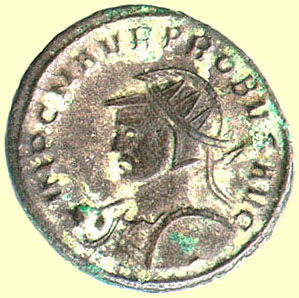 Contents -
Previous Article -
Next Article
Contents -
Previous Article -
Next Article
Probus was another emperor who was very popular with the soldiers. He was an excellent general and had been a career soldier from his youth, working his way up through the ranks. He was also loved by the Senate and the people. After the Army raised him to the purple after the murder of Florianus, Probus graciously sent a letter to the Senate humbly requesting them to elect him emperor, even though he already had the imperial power in his hands.
Probus spent much of his reign successfully fighting Rome's enemies. The list of names of hostile tribes seems endless, but each was a dangerous threat to the empire. Some, like the Sarmatians came to make quick raids while others sought to murder the Roman citizens living in the border lands and settle in their places. No sooner than he had dealt with one band of murdering ruffians than reports of burning Roman villas and estates in another part of the empire reached his ears. But, like his predecessors Claudius Gothicus and Aurelian before him, Probus did actually make steady progress at turning back the savage tide. He taught the hordes of barbarian invaders the meaning of Roman imperial borders and the consequences of crossing them with an armed host. He fought and defeated the Sarmatians Isaurians, Goths, and other tribes. The Rhaetians had been a serious threat but Probus so soundly defeated them that the border with Rhaetia was secure for many years to come. He put down a rebellion by Firmus in Upper Egypt and recovered stolen Roman plunder from Sarmatian raiders after soundly vanquishing them in battle. In A. D. 277, Probus took his legions to Gaul where he chased the Franks and Alemanni back across the Rhine. The Burgundians and Vandals were the next groups to feel the bite of Probus' victorious Roman sword. He also successfully dealt with three more usurpers who would be emperor. The governor of Syria, Saturninus, was proclaimed emperor by his troops evidently against his will. Probus, not seeking revenge but sincerely concerned about restoring order and good government, realized that Saturninus was an experienced and loyal minister and pardoned him. This was not to be with his own troops, however. No sooner than he had received Probus’ mercy his own troops murdered him in clod blood as a traitor to their cause. Two more would be usurpers in Gaul. Bonosus and Proclus.
By this time, Probus had dealt with Rome's enemies, both the foreign invader and the domestic rebel. The roads were free of robbers and a traveler could journey in peace from one end of the empire to another with some reasonable assurance that his throat would not be slit and his wealth taken. The legends on Probus' coins proclaimed him RESTITVTOR ORBIS, or "Restorer of the World." In A. D. 281, the Roman people honored him with a triumph. One sad event marred these celebrations. Four thousand gladiators, who had no hope except for a quick and merciful death in the arena, were to fight each other in the forthcoming games. With little to lose, they revolted and killed their keepers. They were quickly hunted down and killed by the regular troops. This just goes to show that the spectre of incipient slave revolt had always hung over the head of the Romans from the earliest times until after the fall of the empire in the East.
With Rome's enemies vanquished, Probus sought to put the vast Roman legions to useful purpose, having the soldiers work on various public works projects. In fact, Probus hoped to see the day when there would be no need for any more armies. Few of the soldiers cared for this idea, preferring battle with its prospects of rich booty in the event of victory to the life of a common construction laborer in peacetime. Near Sirmium in the modern Serbia, Bosnia, Herzegovina area some troops were put to converting some marshy ground to vineyards. He had also been planning an invasion of Persia at the time, and this idea was not well accepted by many of the soldiers, either. Venting their displeasure at having to do this kind of work, they rebelled and murdered their emperor With the death of Probus, the Roman Empire lost one of the best emperors it was to have during the turbulent Third Century, and one who was a good example for rulers everywhere.
Go to next article on Emperor Carus
Go back to previous article on Emperor Florianus